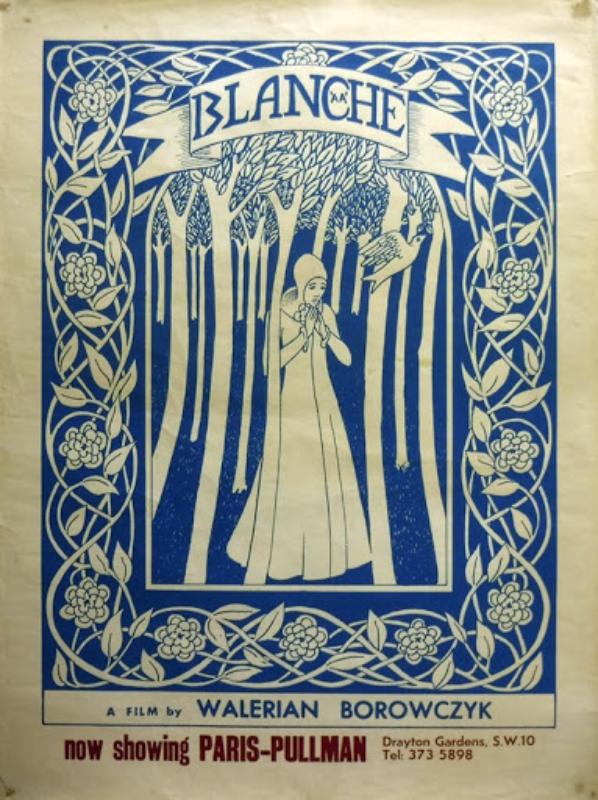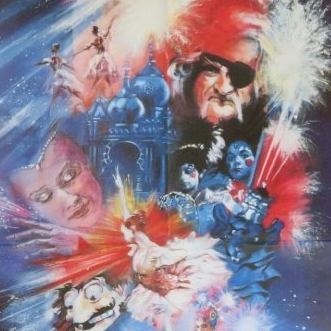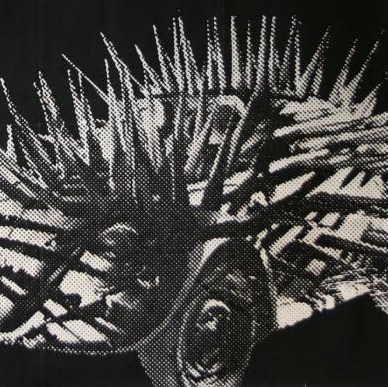Blanche
But you are, Blanche! You are in that thinly veiled metaphor for political machinations in Ukraine!

UK poster | Contemporary Films
1971 — France
A presentation of TÉLÉPRESSE FILMS and ABEL & CHARTON
Cast: MICHEL SIMON, GEORGES WILSON, JACQUES PERRIN and LIGIA BRANICE, with DENISE PÉRONNE, JEAN GRAS and LAWRENCE TRIMBLE
Directed and Written by: WALERIAN BOROWCZYK
Producers: PHILLIPE d'ARGILA and DOMINIQUE DUVERGÉ
Original work by: JULIUSZ SŁOWACKI
Editors: WALERIAN BOROWCZYK and CHARLES BRETONEICHE
Cinematographer: GUY DURBAN
Production Designers: WALERIAN BOROWCZYK and JACQUES d'OVIDIO
Costume design: PIET BOLSCHER
Music: CHRISTIAN BOISSONNADE, ANNIE CHALLAN, AGNÈS FAUCHEAUX, MAURICE-PIERRE GOURRIER and FLORENCE LASSAILLY; arrangements by ROGER COTTE
© [Ligia Borowczyk]
I can't find a trailer, so here are the opening titles instead. I'll warn you now, it features a few shots of a woman bathing, so probably not safe for work, despite not really being sexual in context. (In fact, since I've first posted this, someone's monocle apparently popped and now it can't be embedded. Blah.)
The medieval period is kind of a weird one on film, isn’t it? Maybe it’s just me. What films are there set in the middle ages though? That is to say, medieval Europe. It seems like other cultures are quite willing to dip into that well, whereas western cinema doesn’t so much, unless it’s going for something mythical or something about one historical figure or another, or I guess Robin Hood who may or may not fall into one or both of those. Things that don’t fall neatly into those categories exist, but I’ve had trouble thinking of too many. They mostly seem to be Chaucer based… or, like, adjacent. Maybe because being when Europe gave up any semblance of scientific enquiry in favour of a spot of good old-fashioned god fearin’, theoretically precludes having all the much fun. Please ignore that Chaucer and co. are bawdy as hell.
Anyway, Blanche was Walerian Borowczyk’s second live-action feature, third overall, and the last before it was suggested he make everything all saucy like. Indeed, its general tastefulness feels somewhat surprising seeing it after things like The Beast (1975) and The Strange Case of Dr Jekyll and Miss Osbourne (1981), even being aware of the trajectory of Borowczyk’s career. I’ve written a bit about this in the Dr Jekyll and Miss Osbourne post, so I don’t see any great need to go into any great detail here. Sex is still a major part of the story though…
In yon dark ages, there liveth the eponymous Blanche (Ligia Branice). She resides in a fancy castle with her much older husband, the domineering chatelain (Michel Simon), and is one of those fair maidens of virtue true of which you hear so much. So… one day the king (Georges Wilson) swings on by, together with an entourage of monks and his famously slutty page, Bartolomeo (Jacques Perrin), and hubby lays on some festivities as a result. Both the king and the page pretty much immediately want in on Blanche, a fact that seemingly escapes the chatelain’s notice, but not that of his son, Nicolas (Lawrence Trimble); however, she takes her wimple off for no man. Kind of seems like not even her husband. Nevertheless, the king decides to sneak off from his lodgings in the middle of the night, disguised as his page, to have his way with her, only to be attacked by Nicolas, eager to defend his step-mother’s honour. The chatelain soon gets wind that the page seemingly has designs on his wife, and so follows an array of power struggles and backstabbing between men over their desire to possess Blanche, who is naturally left in the dark over their machinations and not really given much consideration by them in the proceedings.
Suffice to say, it does not end well.
So, yeah, this isn’t based on any pre-extant medieval legend, though it is based on something rather mythical. The overall plot, as in, like, basically all of it, is lifted from a quite well-known story about Ivan Mazepa, an actual historical figure probably best known in to western European audiences via Byron but who enjoys something of a folk hero/villain depending on who you ask status in the east; this is particularly as a figure of opposition to Russian imperialism in Ukraine. That’s as maybe, but the particular story that seemingly penetrated culture and upon which this film is based is seemingly apocryphal, and also to me seems like it was originally intended to be defamatory. Regardless, it is from what I can tell a fairly faithful adaptation of Juliusz Słowacki’s 1840 rendition of the story, albeit with the action moved from 17th century Ukraine to medieval France, the characters renamed accordingly. This, of course, removes it from the context of the power struggles going on in the eastern bloc and gives it a somewhat more understandable setting to western audiences, though the whole thing doesn’t make any bones about its basis, explicitly stating it in the titles, and so between that and the apparent faithfulness to the source material, if you’re in the know, presumably you would still get its contextual significance. Mind you, while I presume that that was intended, the fact that the film is named after the female lead rather the character filling the Mazepa role (it’s Bartolomeo, in case you can’t be bothered to look it up) suggests something a bit different going on in terms of focus. Courtly love is bullshit, man;* Blanche’s weird prize status belies that only one person apparently cares much about what she actually thinks, and that’s the one person who cannot have her under any circumstance. Yes, her stepson is apparently the only one of her would be lovers to particularly care about her as a person, the feeling being mutual, but that is taboo (despite, you know, not actually being related) and they’re both wholesome (by the standards of the day) god fearing types, so, yeah. No one is allowed to be happy, essentially as a result of women’s role as chattel.
It would be quite remiss of me not to talk a bit about the film’s aesthetic. The film oddly has had quite an influence on quite a few medieval set films, most (in)famously Monty Python and the Holy Grail (1975), even if the films in question feel little alike. Its production design is quite meticulous in its attention to detail, and the cinematography and composition does its utmost to try to resemble the appearance of medieval artwork. The camera tends towards a side on view of the action, its frame somehow brimming with small details yet remaining clean and uncluttered seeming, which combined with some stark lighting gives a distinctive look to the piece. The same is true of the soundtrack, which limits itself to period appropriate instrumentation. That isn’t to say it’s a slavish recreation of the art of the period; there is plenty of room for artistic license, mostly involving odd dual purposes of bibles and crucifixes (no, really).
The whole affair is quite wonderful really. It’s actually kind of surprise looking into its backstory; production was apparently quite troubled, with numerous fallings out between the various parties involved, particularly over the casting of Ligia Branice, Borowczyk’s wife, as the eponymous character. The backers apparently wanted the much more bankable, much less married to the director Catherine Deneuve. Borowczyk planned the film with his wife in mind however, and Branice held a lot of sway and Borowczyk he to trust her opinions on composition. She also may be rather limited as an actress, though not being fluent in French I can’t really judge; apparently her delivery is kind of weird, though nothing I’ve seen really explains how exactly. Certainly, the physical side of her performance seems pretty good though. Regardless, her and her Weird Polish Ways™ did seem to serve to get a lot of people’s backs up, particularly that of the actor playing her husband. …Hmm, maybe that’s why it works. His scorn for her was method, whether intended or not.
* In multiple ways even. Aside from the concept being a bit dubious, scholars do question whether it was an actual thing that people engaged in or not.
At time of writing, Blanche is available to rent on Mubi, or streaming on the BFI Player. It's also available for streaming on Amazon if you're subscribed to the BFI services. I recommend JustWatch for keeping up with where films are streaming (including this one!). Alternatively, physical copies are reportedly available for rent via Cinema Paradiso.
The film has had a PG rating from the BBFC since 1995, down from an AA (roughly analogous to a 15) in the '70s. There's very little to get worked up about; there's a few seconds of non-sexual (though full frontal) nudity, as mentioned earlier (that shot from the opening is the extent of it) and a brief bit of blood.
(In case you were wondering why the current home video release has an 18 rating when the film is a PG, it comes with a lengthy interview that is interspersed with clips from the director's other work, including some very NSFW ones.)



